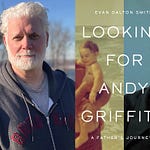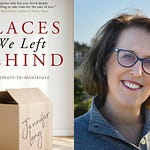Why would anyone want to jumpstart their memoir? For one thing, you’re tasked with plumbing your memory for sometimes difficult material. Added to that is the burden of turning out writing that often feels underwhelming—so much less than we know we can do. For recovering perfectionists, the combination can be daunting.
In today’s episode of The Book I Had to Write, UK-based author
and I discuss strategies for starting a book that we picked up at a recent generative memoir bootcamp led by writing coach Katie Bannon.(Learn more about Katie by reading her post, 5 Reasons To Write Your Taboo Stories, or her reported essay, “I couldn’t stop pulling my hair, What was wrong with me?” published recently in the Washington Post).
We talk about the importance of staying in drafting mode, letting go of perfectionist tendencies, the benefit of doing plenty of “scaffolding” before writing, and embracing a flexible approach to structure. We also discuss the value of accountability and finding a writing practice that works for your schedule and temperament.
Amity Reed is an author and midwife. Her first book was called Overdue. It’s part memoir and part manifesto—a look at her experiences in maternity care in the UK. She’s currently working on a second book, also a memoir. She lives on the south coast of England with her husband and two children.
Did you enjoy today’s episode?
Please consider leaving a review on Apple Podcasts. Reviews really help the show get discovered by new listeners!
Some of our biggest insights and takeaways
Keep focusing on lower the stakes: In an episode two weeks ago,
described being a “recovering perfectionist.” I can cop to that label too. In my case, it meant spending more than my fair share of time over the years writing and rewriting beginnings and then running out of time; or else not really getting to the things I most wanted to.Over time I’ve worked to embrace some version of what Anne Lamott calls, in Bird by Bird, “Shitty First Drafts.”
“Almost all good writing begins with terrible first efforts. You need to start somewhere. Start by getting something—anything—down on paper. What I’ve learned to do when I sit down to work on a shitty first draft is to quiet the voices in my head.”
Or, as Katie Bannon told me at one point: “things can shift when you take your project seriously, but lower the stakes for each day’s writing.”
“I begin each class I teach with a warning: writing the first draft of a memoir can be excruciating. Diving headfirst into memories that lie in the darkest recesses of our minds is difficult enough. Add in the vulnerability of producing the imperfect, “shitty first draft” writing that’s inevitable at this stage? The experience borders on masochism…” —Katie Bannon
How ‘slowing down and letting go’ helps with perfectionism: Amity talks about how, at one point, she felt the need to have a perfectly polished sections before moving forward. But she realized this approach hindered her progress. One big transformation happened when she embraced the idea that writing a memoir is a long-term commitment, and that it will take time.
“I've learned that I was putting too much pressure on myself to try to impose these deadlines and that it was stifling the creativity. And so I've learned to just really slow down and think, this could take years. And that's okay,” she says.
Scaffolding exercises really help—even if you haven’t written a word of your book. Katie’s generative memoir bootcamp was filled with exercises to help participants better understand the building blocks of literary memoir. We came up with character traits, sketched out possible narrative arcs, and developed a potential list of key scenes, among others.
One big takeaway from the week is that doing some planning work even at the beginning stages of drafting can be incredibly helpful in both sharpening the focus and creating more of an arc from the outset.
Your book’s structure is going to evolve…if you let it. In our conversation, Amity describes how, initially, she tried to force her writing into a predetermined structure. But she soon realized that it was constraining her creativity. With guidance from Katie Bannon, Amity explored alternative structures, drawing inspiration from art, poetry, and philosophy. She learned that the structure doesn't have to be explicitly spelled out for the reader but can be an implicit guide for her writing process.
Build in some accountability through co-writing groups and some kind of writing schedule. Accountability is crucial for writers, especially when working on a long-term project like a memoir. Amity says found support and accountability through Zoom writing groups that provided her with a place to share progress, set goals, and hold each other accountable.
As for me, I recently signed up for a co-writing “container”—a Zoom co-writing group, led by author
, that meets three times a week for two hours over 12 weeks. It’s still early days, but I’ve found that knowing I have to show up at least those hours every week has allowed me to produce many more super-rough pages than I would’ve otherwise during a very busy time."I don’t think you have to write every day. But you can put those practices into place... that you are being consistent, even if that consistency is quite slow, even if that's only once or twice a week, because that's what you can fit into your life right now. That's okay. It doesn't have to be like everyone else's practice,” says Amity.
Looking for 5 tips to jumpstart your memoir? Check out my original post about the tips I learned during Katie Bannon’s generative bootcamp last fall:
Further reading/discussed on the show
Overdue: Birth, burnout and a blueprint for a better NHS, by Amity Reed Bookshop (UK) | Amazon (UK)
“The Illusion of the First Draft,” by Katie Bannon, Brevity magazine
“Five Reasons to Write Your ‘Taboo’ Stories,” by Katie Bannon
Credits
This episode was edited and produced by Chérie Newman at Magpie Audio Productions. Theme music is "The Stone Mansion" by BlueDot Productions.















